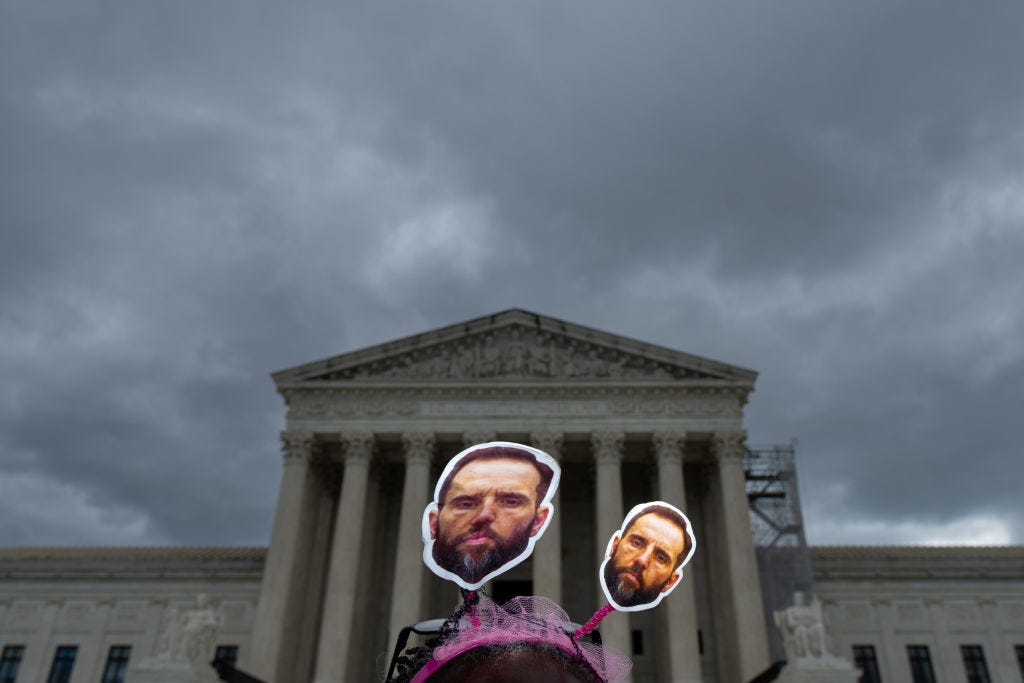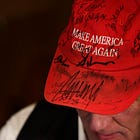Trump versus United States
Some thoughts on the Supreme Court’s decision — from the Court, Richard Nixon, and our archives
On reading the Supreme Court’s 6-3 opinion in Trump v. United States, along with the dissents, Watergate was the first thing that sprang to mind. Many of you will remember former president Nixon’s 1977 extended conversation with journalist David Frost (certainly this guy does):
It is true that the decision doesn’t say exactly that — it admits there are some illegal things presidents might do that they could be punished for. But it suggests that so long as a president was careful to do those things — or even just talk about them — through official channels, there’d be no way for the courts to act on them. Meaning Nixon would likely have had little to worry about. And that’s worrisome.
We’ve reached out to the smartest constitutional scholars we know. They’re all obviously very busy today but we’ll keep you posted on what we learn once we have more information.
For now, we turn to the justices themselves, to Richard Nixon, and to our archives (which we encourage you to check out for these and other essential insights) for some analysis of the ruling and its implications
A request for those who haven’t yet joined us: The interviews and essays that we share here take research and editing and much more. We work hard, and we are eager to bring on more writers, more voices. But we need your help to keep this going. Join us today to support the kind of independent media you want to exist.
And today and through the holiday weekend we’re offering new paid subscribers a special discount of 20 percent. You will lock in this lower price forever if you join us now!
From Justice Sonia Sotomayor’s dissent in Trump v. United States
The Court now confronts a question it has never had to answer in the Nation's history: Whether a former President enjoys immunity from federal criminal prosecution. The majority thinks he should, and so it invents an atextual, ahistorical, and unjustifiable immunity that puts the President above the law.
The majority makes three moves that, in effect, completely insulate Presidents from criminal liability. First, the majority creates absolute immunity for the President's exercise of "core constitutional powers." Ante, at 6. This holding is unnecessary on the facts of the indictment, and the majority's attempt to apply it to the facts expands the concept of core powers beyond any recognizable bounds. In any event, it is quickly eclipsed by the second move, which is to create expansive immunity for all "official act[s]." Ante, at 14. Whether described as presumptive or absolute, under the majority's rule, a President's use of any official power for any purpose, even the most corrupt, is immune from prosecution. That is just as bad as it sounds, and it is baseless. Finally, the majority declares that evidence concerning acts for which the President is immune can play no role in any criminal prosecution against him. See ante, at 30-32. That holding, which will prevent the Government from using a President's official acts to prove knowledge or intent in prosecuting private offenses, is nonsensical.
The President of the United States is the most powerful person in the country, and possibly the world. When he uses his official powers in any way, under the majority’s reasoning, he now will be insulated from criminal prosecution. Orders the Navy’s Seal Team 6 to assassinate a political rival? Immune. Organizes a military coup to hold onto power? Immune. Takes a bribe in exchange for a pardon? Immune. Immune, immune, immune.
From Justice Ketanji Brown Jackson’s dissent in Trump v. United States
The majority of my colleagues seems to have put their trust in our Court’s ability to prevent Presidents from becoming Kings through case-by-case application of the indeterminate standards of their new Presidential accountability paradigm. I fear that they are wrong. But, for all our sakes, I hope that they are right.
In the meantime, because the risks (and power) the Court has now assumed are intolerable, unwarranted, and plainly antithetical to bedrock constitutional norms, I dissent.
Richard Nixon, to David Frost, 1977
Frost: So, what in a sense you’re saying is that there are certain situations and the Huston plan or that part of it was one of them where the president can decide that it’s in the best interest of the nation or something and do something illegal.
Nixon: Well, when the president does it … that means that it is not illegal.
Frost: By definition –
Nixon: Exactly … exactly… if the president … if, for example, the president approves something … approves an action, ah … because of the national security or in this case because of a threat to internal peace and order of, ah … ah … significant magnitude … then … the president’s decision in that instance is one, ah … that enables those who carry it out to carry it out without violating a law. Otherwise they’re in an impossible position.
Frost: So that the black-bag jobs that were authorized in the Huston plan … if they’d gone ahead, would have been made legal by your action?
Nixon: Well … I think that we would … I think that we’re splitting hairs here. Burglaries per se are illegal. Let’s begin with that proposition. Second, when a burglary, as you have described a black-bag job, ah … when a burglary, ah … is one that is undertaken because of an expressed policy decided by the president, ah … in the interests of the national security … or in the interests of domestic tranquility … ah … when those interests are very, very high … and when the device will be used in a very limited and cautious manner and responsible manner … when it is undertaken, then, then that means that what would otherwise be technically illegal does not subject those who engage in such activity to criminal prosecution. That’s the way I would put it. Now, that isn’t trying to split hairs … but I do not mean to suggest the president is above the law … what I am suggesting, however, what we have to understand, is, in wartime particularly, war abroad, and virtually revolution in certain concentrated areas at home, that a president does have under the Constitution extraordinary powers and must exert them with … as little as possible. .
The saddest thing to see is what has happened to the courts because they are usually the last bulwark against autocracy. That's why the G.O.P. has tried for so many decades to control them and take us from a representative democracy to an autocracy run by the decrees of lackeys. People need to look more deeply at why the courts have failed. There have been so many threats against judges, juries, lawyers, and others in this system — the issue is not just complicity and incompetence, but fear of threats. We are living in a mafia state.
He is a weak man who has always longed to be a strong man, and he is a weak man’s idea of a strong man, and right before he got sick he made it clearer than ever that he intends to be a strongman. Some, knowing their history and knowing the pretensions of weak men and strongmen and weak men who become strongmen, have warned us about this potential from the beginning. But others, more cautious, more trusting in the power of institutions to save us, waited until recently to begin sounding the alarm. This is how democracy ends, they began to whisper. This is how it happens. He is attempting to do this right before our eyes.
But we have to save ourselves. This is the essence of democracy, expressing yourself through your right to vote, and your right to assemble and protest. And elsewhere in the world, when democracy has been regained, quite painfully, it’s been through a combination of mass mobilization with electoral strategy and messaging — positive messaging, future-oriented messaging. But mass mobilization and building the democracy movement are fundamental, because as we have seen in the past, there's always going to be limits to what the legal system will do with these types of people.
I became increasingly uncomfortable with having my work reviewed by an institution that just isn't functioning in a way I learned courts are supposed to function. These made-up doctrines like “major questions” — I thought they were so unprincipled. It would have been my obligation to figure out what those mean and apply them. I didn't want to spend the rest of my life figuring out how to obey the Supreme Court.
The reason why it's critically important to have some governmental accountability, on child separation for example, because you can't just look forward at the destruction of families. You can't. Someone has to be held accountable for it, or else you have allowed the line to move. And now this becomes a policy position that maybe you would find repugnant and not undertake yourself, but it becomes something that can happen. It’s a policy that is available for political leaders or actors to embrace. And so we have to understand that every time we turn away from accountability, we allow the needle to move.
Your support makes The Ink possible. We’d be honored if you’d become a paid subscriber. When you do, you’ll get access each week to our regular posts and our interviews with the most thoughtful people out there — and you’ll be able to join the conversation in our comments section.









